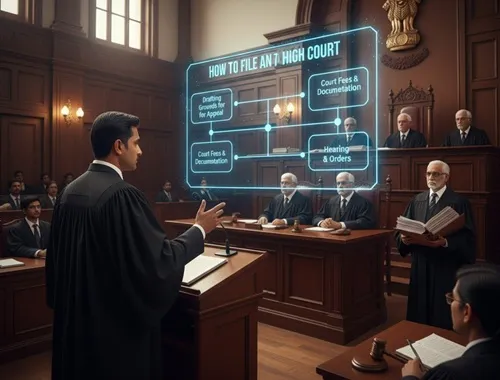How to File an Appeal in the High Court.

Step-by-Step Process to File an Appeal
1. Identify if the Order is Appealable
Appeals can be filed against:
- Civil decrees or judgments from District Courts
- Criminal convictions from Sessions or Magistrate Courts
- Certain writs or tribunal orders (as permitted by law)
Example: If a District Court passes a decree in a property dispute, the losing party can appeal in the concerned High Court.
2. Check the Time Limit (Limitation Period)
- Civil Appeals: 90 days from the date of decree or order.
- Criminal Appeals: 30–60 days, depending on case type.
- Delay can be condoned if you file a delay condonation application with valid reasons (like medical emergencies or late receipt of judgement).
3. Draft the Memorandum of Appeal
Prepared by an advocate, it must contain:
- Court name and parties' details
- Details of the judgment/order being challenged
- Legal grounds of appeal
- Relief sought (e.g., reversal, modification, stay)
4. Attach Supporting Documents
- Certified copy of the judgment/decree/order
- Copies of pleadings, exhibits, or evidence (if required)
- Court fee receipt (as per High Court schedule)
- Vakalatnama (advocate authorization)
- Identity proofs (for record)
5. File the Appeal
- Submit all papers to the Filing Section/Registry of the concerned High Court.
- The registry checks compliance; if defects are found, you must rectify them before listing.
Where to Apply:
- Appeal must be filed in the High Court that has jurisdiction over the lower court that passed the judgment.
- Online Filing: Many High Courts now support e-filing portals:
| State | High Court Portal |
|---|---|
| Delhi | https://delhihighcourt.nic.in |
| Maharashtra | https://bombayhighcourt.nic.in |
| Karnataka | https://rtionline.karnataka.gov.in/guidelines.php?appeal |
| Tamil Nadu | https://rtionline.tn.gov.in/appeal/firstAppeal.php?lan=E |
6. Admission & Final Hearing
- Court first checks if the appeal is maintainable (called the admission stage).
- If admitted, notice is issued to the other party.
- Both sides argue during the final hearing.
- The High Court may confirm, modify, reverse, or remand the case back to the lower court.
Court Fees
- Civil Appeals: Based on case value, usually 1–2% of the amount involved (subject to cap as per court rules).
- Criminal Appeals: Usually a nominal fee or sometimes none.
- Vakalatnama & Misc. Fees: ₹10–₹100 (state-wise variation).
- Check respective High Court websites for updated fee notifications.
Practical Tips
- File within limitation; delays weaken credibility.
- Grounds of appeal should be legal, not emotional.
- Get certified copies early to avoid missing deadlines.
- Use an advocate familiar with High Court procedures.
Frequently Asked Questions (FAQs)
-
1. What's the difference between appeal and revision?
-
Appeal re-examines the entire case. Revision checks only legal or jurisdictional errors.
-
2. Do I need an advocate?
-
Yes. Though self-representation is allowed, it's rarely advisable for High Court matters.
-
3. Can delay be excused?
-
Yes, by filing a delay condonation application showing valid reasons.
-
4. What happens if the appeal is dismissed?
-
You can approach the Supreme Court with a further appeal if grounds exist.
-
5. Is a court fee necessary?
-
Yes, as per the Court Fees Act and High Court rules.
-
6. Can I seek a stay during the appeal?
-
Yes, you can apply for interim relief, such as a stay on decree or suspension of sentence.
-
7. Can new evidence be added?
-
Only in exceptional cases, if justice demands it, with the court's permission.
-
8. Who hears appeals in the High Court?
-
Usually a Division Bench (two judges) or a Single Judge Bench, depending on case type.
-
9. Can an appeal be withdrawn?
-
Yes, with the court's permission before final judgement.
-
10. How long does an appeal take?
-
It depends on the backlog — it can range from a few months to several years.
-
11. Is a certified copy of the judgement compulsory?
-
Yes. Without it, the appeal is incomplete.
-
12. Can I file an appeal online?
-
Yes, most High Courts offer e-filing; however, physical submission is still common.
-
13. Can the State appeal against acquittal?
-
Yes, the prosecution can appeal an acquittal in criminal cases.
-
14. What is a Letters Patent Appeal (LPA)?
-
An intra-court appeal from a Single Judge's order to a Division Bench, allowed in some High Courts.
-
15. Can multiple parties file one appeal?
-
Yes, if they share the same grievance or relief sought.
-
16. What if the registry finds defects?
-
The appeal won't be listed until you correct them within the given time.
-
17. Do I need to be personally present?
-
Usually no, unless the court specifically calls for it.
-
18. What reliefs can be granted?
-
The High Court can confirm, modify, reverse, or remand the case.
-
19. Can I appeal against an interim order?
-
Only if the law allows. Otherwise, a revision or writ petition may be filed.
-
20. How can I track my appeal status?
-
Through your High Court's website using the case number or party name.
Add new comment